地獄に仏とは?
意味
「地獄に仏」とは、非常に困難な状況や絶望的な状態の中で、思いがけず助けや救いが訪れることを意味します。
「地獄」:もともとは仏教の教えで、苦しみの極限状態を指します。転じて、比喩的に困難や絶望的な状況を表します。
「仏」:苦しむ者を救う慈悲深い存在。ここでは助けや希望の象徴。
極限状態で突然の救いに出会うことで、大きな安堵感や希望が得られる状況を指す表現です。
由来
この表現は、仏教の思想に基づいています。
仏教では、地獄は生前の行いによって堕ちる世界とされ、耐えがたい苦しみに満ちています。
そんな地獄で仏に出会うことは、信じられないような救済や奇跡を意味します。
日常生活において、この教えが比喩的に使われるようになり、「絶望の中での救い」という意味で定着しました。
現代での解釈と使い方
緊急時の助け
例:忘れ物をして困っているときに友人が予備を持っていた場合。
「試験直前にペンが壊れたけど、友達が予備を持っていて助かった。本当に地獄に仏だった!」
絶望的な状況での希望
例:倒産しかけた会社に突然の大口取引が舞い込んだ場合。
「あの契約が取れたおかげで、会社が救われた。まさに地獄に仏だった。」
偶然の出会いや救済
例:人ごみで迷子になった子供を探していたら、ちょうど警察官が近くにいた。
「警察官がいたおかげで、迷子の子供を無事に見つけられた。地獄に仏とはこのことだね。」
ポジティブな教訓
この表現は、どんな困難な状況にも思いがけない助けや救いが訪れる可能性があることを教えてくれます。
人生には予測不可能な出来事が多く、絶望的な状況でも希望を持つことの大切さを伝えています。
また、日常の中での他人の親切や支援を感謝する姿勢も促しています。
類似表現と対義表現
類似表現
「渡りに船」:必要な時に都合の良いことが起こる。
「棚からぼたもち」:思いがけない幸運が訪れる。
「鴨が葱を背負ってくる」:偶然の幸運が舞い込む。
対義表現
「踏んだり蹴ったり」:次々と悪いことが起きる。
「泣きっ面に蜂」:困っているところにさらに不運が重なる。
「災い転じて福となす(反転のケース)」:一見不幸に見えることが結果的に幸運をもたらす。
注意点
「地獄に仏」は、基本的に他人からの助けや偶然の救いに使う表現です。そのため、自力で問題を解決した場合には使用しません。また、過剰に使うと感謝の気持ちが軽視されるように見えることがあるため、謙虚な姿勢で使うことが望ましいです。
「地獄に仏」は、最悪の状況で予想外の助けが得られることを意味する言葉で、人生の中で経験する予期せぬ救いを象徴する表現です。この言葉を通じて、どんな状況でも希望を捨てず、他人からの支援に感謝する心の大切さを学ぶことができます。
Meaning
To “be a Buddha in hell” means to be in a very difficult or hopeless situation, when help or salvation comes to you unexpectedly.
Hell”: Originally a Buddhist teaching, it refers to an extreme state of suffering. In other words, it metaphorically refers to a difficult or hopeless situation.
Buddha: A benevolent being who saves those who suffer. Here it symbolizes help and hope.
The expression refers to a situation of great relief and hope when one encounters sudden salvation in an extreme situation.Origin
This expression is based on Buddhist thought.
In Buddhism, hell is considered to be a world in which one falls according to one’s deeds during life, and is filled with unbearable suffering.
To encounter the Buddha in such a hell means unbelievable salvation and miracles.
In everyday life, this teaching came to be used figuratively and took on the meaning of “salvation in the midst of despair.Modern Interpretation and Usage
Help in an emergency
E.g.: “I forgot something and am in trouble, and a friend has a spare.
For example, “My pen broke just before the exam, but my friend had a spare and saved my life. It was truly a blessing in disguise!”Hope in a desperate situation
Example: A company on the verge of bankruptcy suddenly receives a large deal.
The company was saved thanks to that contract. It was truly a Buddha in hell.”A chance encounter or salvation
Example: A police officer was nearby when you were looking for a child lost in a crowd.
Thanks to the police officer’s presence, the lost child was found safely. That’s what I call Buddha in hell.”Positive Lesson
This expression tells us that unexpected help and salvation can come to any difficult situation.
Life is full of unpredictable events, and it conveys the importance of having hope even in hopeless situations.
It also encourages us to be grateful for the kindness and support of others in our daily lives.Similar Expressions and Contrasting Expressions
Similar Expressions
Watarini-bune”: something convenient happens when you need it.
Tanakara-botamochi”: unexpected good fortune comes your way.
The duck comes carrying a leek”: an accidental stroke of good fortune.Contrasting Expressions
Trample and kick: Bad things happen one after another.
Bumblebee in the face of tears: Bad luck piling up on top of bad luck.
In the case of a reversal, what appears to be a misfortune turns out to be a blessing in disguise.Points to keep in mind
The phrase “hell is a Buddha” is basically used to describe help from others or accidental salvation. Therefore, it should not be used when a person solves a problem by himself/herself. It is also advisable to use it with humility, as excessive use may make it seem as if gratitude is being disregarded.The phrase “jigoku ni butsu” means unexpected help in the worst of circumstances and symbolizes the unexpected salvation one experiences in life. Through this phrase, we can learn the importance of not giving up hope in any situation and being grateful for the support we receive from others.
AIが描いた「地獄に仏」
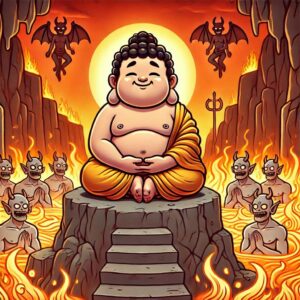
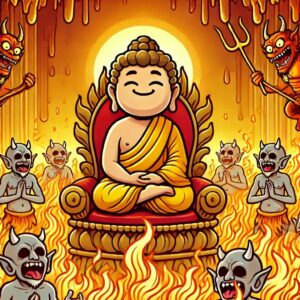

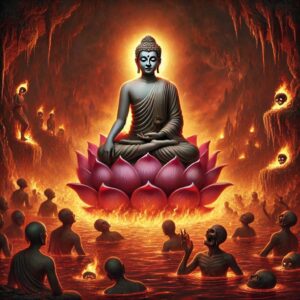
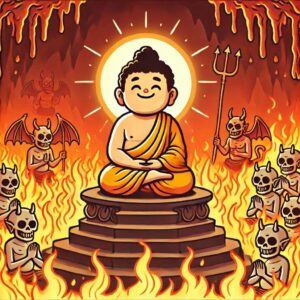
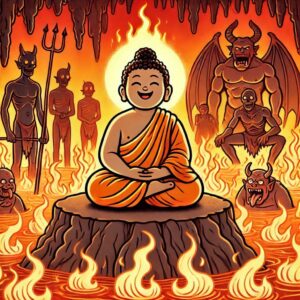
















コメント